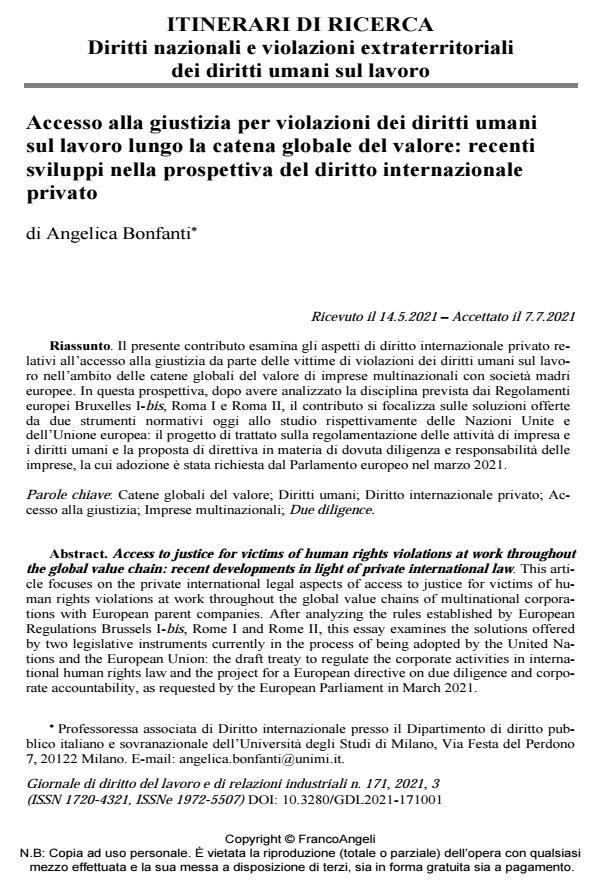Access to justice for victims of human rights violations at work throughout the global value chain: recent developments in light of private international law.
Journal title GIORNALE DI DIRITTO DEL LAVORO E DI RELAZIONI INDUSTRIALI
Author/s Angelica Bonfanti
Publishing Year 2021 Issue 2021/171
Language Italian Pages 22 P. 369-390 File size 274 KB
DOI 10.3280/GDL2021-171001
DOI is like a bar code for intellectual property: to have more infomation
click here
Below, you can see the article first page
If you want to buy this article in PDF format, you can do it, following the instructions to buy download credits

FrancoAngeli is member of Publishers International Linking Association, Inc (PILA), a not-for-profit association which run the CrossRef service enabling links to and from online scholarly content.
Access to justice for victims of human rights violations at work throughout the global val-ue chain: recent developments in light of private international law. This article focuses on the private international legal aspects of access to justice for victims of human rights violations at work throughout the global value chains of multinational corporations with European parent companies. After analyzing the rules established by European Regulations Brussels I-bis, Rome I and Rome II, this essay examines the solutions offered by two legislative instruments currently in the process of being adopted by the United Nations and the European Union: the draft treaty to regulate the corporate activities in international human rights law and the project for a European directive on due diligence and corporate accountability, as requested by the Eu-ropean Parliament in March 2021.
Keywords: Global value chains; Human rights; Private international law; Access to justice; Multinational corporations; Due diligence.
- Decent work and core labour standards: how to achieve effectiveness? Simona Bilancia, Massimiliano Delfino, Umberto Gargiulo, Francesca Maffei, in Journal of Services Marketing /2025 pp.960
DOI: 10.1108/JSM-03-2025-0188 - Lieferkettensorgfaltspflichtengesetz: perché è nata e quali sono i suoi principali contenuti Luca Nogler, in GIORNALE DI DIRITTO DEL LAVORO E DI RELAZIONI INDUSTRIALI 173/2022 pp.1
DOI: 10.3280/GDL2022-173001 - Lo sfruttamento dei lavoratori nelle catene di appalto Silvia Borelli, Giovanni Orlandini, in GIORNALE DI DIRITTO DEL LAVORO E DI RELAZIONI INDUSTRIALI 173/2022 pp.109
DOI: 10.3280/GDL2022-173005 - Il problema dell'essere umano nel diritto Hugo Sinzheimer, in GIORNALE DI DIRITTO DEL LAVORO E DI RELAZIONI INDUSTRIALI 173/2022 pp.39
DOI: 10.3280/GDL2022-173002 - oportunidades “perdidas” en el proceso de “europeización” de diligencia debida en sostenibilidad corporativa Maria Chiara Marullo, in Lex Social: Revista de Derechos Sociales /2024 pp.1
DOI: 10.46661/lexsocial.10853 - Take Due Diligence Seriously: commento alla direttiva 2024/1760 Fausta Guarriello, in GIORNALE DI DIRITTO DEL LAVORO E DI RELAZIONI INDUSTRIALI 183/2024 pp.245
DOI: 10.3280/GDL2024-183001
Angelica Bonfanti, Accesso alla giustizia per violazioni dei diritti umani sul lavoro lungo la catena globale del valore: recenti sviluppi nella prospettiva del diritto internazionale privato in "GIORNALE DI DIRITTO DEL LAVORO E DI RELAZIONI INDUSTRIALI " 171/2021, pp 369-390, DOI: 10.3280/GDL2021-171001